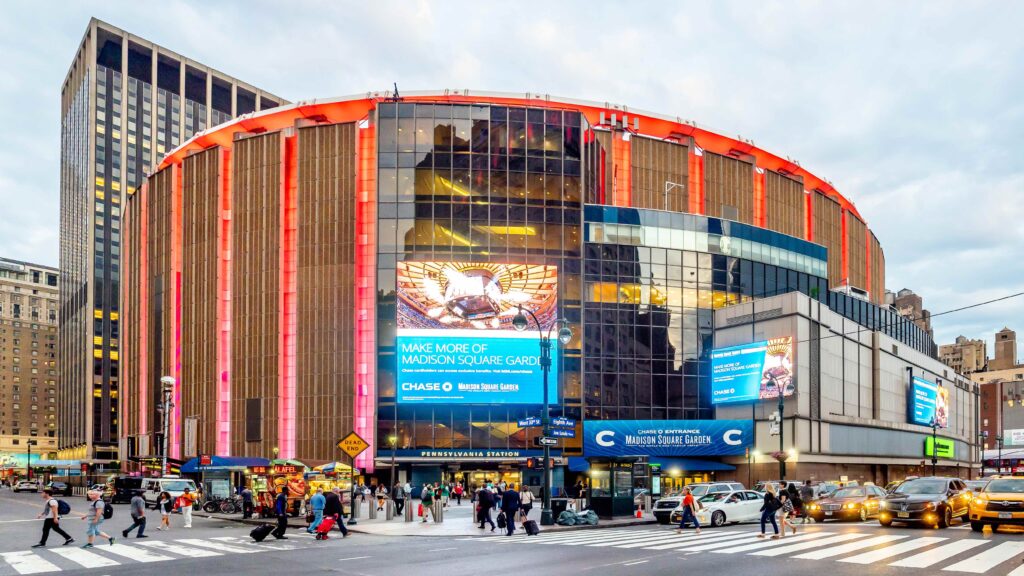(NEW YORK) — Storied entertainment complex, Madison Square Garden (MSG) may be asked to move to make way for other city plans.
Will the storied sports and entertainment venue stay at the current location of 31st Street between 7th and 8th Avenues through its existing permit, or will the city deny the permit forcing the venue to find another home?
The future of MSG was the focus of a virtual Manhattan Community Board 5 Land Use, Housing & Zoning (CB5) committee meeting on Feb. 22 during which members of the public were invited to share their opinion.
New Yorkers have been weighing the future home of The Garden for the last decade.
The venue, which is privately owned and operated by billionaire James Dolan’s Madison Square Garden Entertainment Inc., is home to two of the most recognizable franchises in US sports —the New York Knicks and the New York Rangers—and hosts more than 300 events a year from shows, like Billy Joel’s residency concerts to signature events, like The Grammy Awards.
The venue sits atop New York City-owned and operated Penn Station, the city’s main intercity railroad station and one of the busiest transportation facilities serving more than 600,000 passengers per weekday.
MSG’s original 50-year permit expired in 2013 when the City Council issued a new special permit for 10 years. That permit, which allows MSG to hold public events, is set to expire in July 2023.
Amid opposition from Dolan, NYC Council Member Erik Bottcher, who represents the district where MSG is located, has sparked renewed discussions about relocating MSG to Hudson Yards’ Western Rail Yards, three avenues west at 33rd Street and 11th Avenue.
“If we can move Madison Square Garden to the Western Rail Yards, we will get a world-class arena, and a world-class train station, it’ll be a win-win for the city of New York, ” he told ABC7NY Eyewitness News in February 2023.
Along with Bottcher, developers, community board members, and other local leaders are closely monitoring the upcoming permit expiration.
The Feb. 22 zoning meeting was weighted in support of MSG staying at its current location with architect and urban designer Stephen Johnson, presenting The NYC Department of City Planning (DCP)’s case for a special permit request.
MSG Executive Vice President Joel Fisher spoke in support of the special permit request, noting that a location move would cost New Yorkers $8.5 billion and opining that there are better uses for public funds. He added that MSG generates $2 billion of economic impact to the city annually and that no other major stadium or arena in New York City requires a special permit to operate. Fisher suggested a willingness to accommodate New York Gov. Kathy Hochul’s plans for Penn Station expansion and that a move across the street on Seventh Avenue, between 32nd and 34th streets, could potentially satisfy MSG though he questioned who would pay for that move.
Elise Wagner, partner and co-chair of the land use practice at New York City-based law firm Kramer Levin, presented to the CB5 committee the application for the special permit in conjunction with the Department of City Planning. Wagner shared in favor of staying at its current location that the purpose of a special permit is to allow operation at a specific location, not to encourage organizations and institutions to move locations, and that there are other procedures related to selling property.
Layla Law-Gisiko, the chair of CB5, who moderated the four-hour meeting, asked for clarification on what happened between 2013 and 2023 and why the 2013 City Council-approved special permit did not have any stipulations around relocation. Fisher said such stipulations were discussed but no action was taken.
Community members who spoke at the meeting varied from those in support of MSG moving locations and renovating Penn Station to those reliving fun times spent at MSG worried that attendance would drop if the venue were no longer accessible via Penn Station.
As Madison Square Garden continues to stand amid the ever-changing skyline of New York City, it’s clear that in the city that never sleeps, even the most iconic landmarks are always in a state of evolution.


